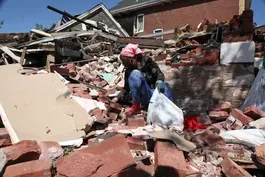
Tribal colleges face uncertain future amid funding cuts
Clip: 5/20/2025 | 7m 54sVideo has Closed Captions
Tribal colleges face uncertain future amid federal funding cuts
Tribal colleges and universities have endured decades of chronic underfunding, relying heavily on federal support to stay afloat. Now, the Trump administration’s broad cuts to federal programs are hitting Indian Country hard, posing a serious threat to the future of these vital institutions. Stephanie Sy reports for our series, Rethinking College.
Problems with Closed Captions? Closed Captioning Feedback
Problems with Closed Captions? Closed Captioning Feedback
Major corporate funding for the PBS News Hour is provided by BDO, BNSF, Consumer Cellular, American Cruise Lines, and Raymond James. Funding for the PBS NewsHour Weekend is provided by...

Tribal colleges face uncertain future amid funding cuts
Clip: 5/20/2025 | 7m 54sVideo has Closed Captions
Tribal colleges and universities have endured decades of chronic underfunding, relying heavily on federal support to stay afloat. Now, the Trump administration’s broad cuts to federal programs are hitting Indian Country hard, posing a serious threat to the future of these vital institutions. Stephanie Sy reports for our series, Rethinking College.
Problems with Closed Captions? Closed Captioning Feedback
How to Watch PBS News Hour
PBS News Hour is available to stream on pbs.org and the free PBS App, available on iPhone, Apple TV, Android TV, Android smartphones, Amazon Fire TV, Amazon Fire Tablet, Roku, Samsung Smart TV, and Vizio.
Providing Support for PBS.org
Learn Moreabout PBS online sponsorshipEOFF BENNETT: Tribal colleges and universities have endured decades of chronic underfunding, relying heavily on federal support to stay afloat.
Now the Trump administration's broad cuts to federal programs are hitting Indian country hard and posing a serious threat to the future of these vital institutions.
Stephanie Sy reports for our series Rethinking College.
STEPHANIE SY: Ella Bowen was midway through freshman year at Haskell Indian Nations University in Lawrence, Kansas, when her academic world was turned upside down.
ELLA BOWEN, Haskell Indian Nations University Student: Absolutely nobody knew it was coming.
This is something I never thought would happen, just because this is our education.
And I thought, if anything, that the government is supposed to protect our education and not cause harm to it.
KAIYA BROWN, Southwestern Indian Polytechnic Institute Student: This semester, I am going to be taking math for elementary and middle school teachers.
STEPHANIE SY: Nearly 800 miles away, in Albuquerque, New Mexico, Kaiya Brown was having a similarly surreal day at SIPI, the Southwestern Indian Polytechnic Institute.
KAIYA BROWN: There was so much misinformation at the time.
There was so much chaos.
It was just chaos.
Like, I can't explain it and emphasize even more.
It was just chaos.
STEPHANIE SY: But people were just gone from campus.
KAIYA BROWN: Like, I came into class.
The cubicles were empty.
People that I usually say good morning to, their offices were off, like, empty, lights off, everything.
STEPHANIE SY: On February 14, the Trump administrations wave of federal job cuts arrived on SIPI's campus without warning, wiping out nearly a quarter of the staff.
For this small tribal college, already chronically and visibly under resourced, the day was described as traumatic.
KAIYA BROWN: There was so much that had to be done, but no one to do it.
And there were students that did not know if SIPI was even open anymore.
There was questions if the school even existed anymore.
STEPHANIE SY: Teachers weren't the only ones affected.
Ella Bowen says other school support staff were fired.
ELLA BOWEN: Being left without maintenance, custodial, and R.A.s, everything was super messy and almost unsafe.
I mean, there was overflowing trash cans.
The quality of food significantly decreased.
SUE PARTON, President, Federation of Indian Service Employees: It's always thought of being a stable job, especially in Indian country STEPHANIE SY: Sue Parton is the president of the Federation of Indian Service Employees, representing some 5,500 federal workers in 23 states and a longtime instructor at SIPI.
SUE PARTON: One employee at SIPI that contacted me and said he was in the middle of teaching a class, this is in the middle of the trimester, and he was pulled out of his class.
And he had two hours to clean out his office and get off of campus.
The professors who did not get fired had to then pick up extra class loads, so that at least something would be offered to the students.
STEPHANIE SY: After several weeks, all employees at SIPI and Haskell were reinstated, but not everyone returned.
PBS News reached out to the Bureau of Indian Education about the firings, but they did not respond.
SUE PARTON: It is very traumatic.
Even now, we have an imminent reduction in force now, and so the union is getting calls from our members all the time.
That never would have happened prior to this administration because, it's like this administration just ignores the norm.
STEPHANIE SY: SIPI and Haskell are two of the 37 tribal colleges and universities in the U.S. and the only two operated by the federal government.
AHNIWAKE ROSE, President and CEO, American Indian Higher Education Consortium: That means that all of their employees are federal employees.
All of their buildings are federal buildings.
STEPHANIE SY: Ahniwake Rose is the president and CEO of the American Indian Higher Education Consortium.
AHNIWAKE ROSE: So, the federal government has a direct responsibility for education through treaties that our nation signed when we ceded over a billion acres of land to the federal government.
MAN: What we are saying here is that you must allow us to live in peace.
You must allow us to live as sovereign people.
STEPHANIE SY: But the U.S. government's failure to live up to those treaty obligations has long been a problem.
In 1969, then-Senator Ted Kennedy submitted a lengthy report calling Indian education a national tragedy.
He wrote: "The first American had become the last American with the opportunity for employment, education, a decent income, and the chance for a fulfilling and rewarding life."
To this day, American Indians and Alaska Natives have the lowest college graduation rate of any racial or ethnic group.
Kaiya Brown says community colleges like SIPI are many Native students only chance for a higher education.
KAIYA BROWN: A lot of us are growing up on the reservation.
A lot of us are living in our own respective tribal communities.
And jumping from very small, tight-knit areas to a huge institution with thousands of students is really hard.
STEPHANIE SY: But other funding reductions loom over Native colleges, part of the Trump administration's cost-cutting efforts.
TWYLA BAKER, President, Nueta Hidatsa Sahnish College: It's been up and down.
It has been myriad changes and rapid fire.
And it continues to happen because it's not necessarily one particular funding source.
It is several.
STEPHANIE SY: Twyla Baker is the president of Nueta Hidatsa Sahnish College in North Dakota.
She says President Trump's executive orders have severely impacted federal grants for programs at the college, including grants that bolstered its agricultural and stem programs, investments that studies show reap returns for tribal economies.
TWYLA BAKER: Our students have a tendency to stay where they are, to work where they are, and really just kind of improve the quality of life.
Pulling these dollars is not just an injustice.
It's kind of a travesty, really.
STEPHANIE SY: Tribal colleges and universities serve some of the country's most economically vulnerable students, offering low or free tuition.
Without massive endowments, federal funding is their lifeblood.
TWYLA BAKER: I have kind of compared it to something of a death by strangulation, so to speak.
You don't necessarily have to say - - tell a college you're going to shut down, we have to shut you down.
You can shut down a college by cutting off their resources, however.
STEPHANIE SY: Back at Haskell, freshman Ella Bowen says students are still reeling from the upheaval.
ELLA BOWEN: My academic adviser was fired, and it left me clueless for the next steps of my education.
I didn't know how to sign up for my next classes.
I didn't know what classes I had to sign up for.
STEPHANIE SY: Bowen and Kaiya Brown are plaintiffs in a lawsuit brought by the Native American Rights Fund that not only claims that federal officials failed to consult tribes before making cuts, as required by law, but also violated Native students' rights to receive an adequate post-secondary education.
ELLA BOWEN: I felt hopeless for a long time, like, what am I, a 19-year-old girl, college student, going to do about the government?
STEPHANIE SY: Has it been hard for you to come out and speak so openly about what's going on at SIPI?
KAIYA BROWN: As indigenous people, it's always about giving back to your people.
It's always about, how am I going to serve my community?
I don't want that to be taken from us, and I will not let that be taken from us.
STEPHANIE SY: The fact that the Bureau of Indian Education has reversed the layoffs for now hasn't raised Brown's confidence in a system that has long failed her people.
For the "PBS News Hour," I'm Stephanie Sy in Albuquerque, New Mexico.
Ex-FAA official discusses near misses and outages
Video has Closed Captions
Clip: 5/20/2025 | 5m 27s | 'Vintage' air traffic system to blame for near misses and outages, ex-FAA official says (5m 27s)
Is defending Taiwan vital to U.S.? Experts offer views
Video has Closed Captions
Clip: 5/20/2025 | 9m 35s | Is defending Taiwan a vital U.S. interest? Experts offer differing views (9m 35s)
Jonathan Capehart on his new memoir 'Yet Here I Am'
Video has Closed Captions
Clip: 5/20/2025 | 7m 22s | Jonathan Capehart chronicles his journey toward self-discovery in 'Yet Here I Am' (7m 22s)
News Wrap: UN says aid still not reaching Gaza
Video has Closed Captions
Clip: 5/20/2025 | 6m 7s | News Wrap: UN says aid still not reaching Gaza (6m 7s)
Spring storms spark FEMA scrutiny as Trump overhauls agency
Video has Closed Captions
Clip: 5/20/2025 | 7m 4s | Spring storms spark scrutiny of FEMA as Trump overhauls and slashes the agency (7m 4s)
Trump pushes GOP holdouts to support his domestic bill
Video has Closed Captions
Clip: 5/20/2025 | 7m 2s | Trump pushes GOP holdouts on Capitol Hill to support his massive domestic policy bill (7m 2s)
Providing Support for PBS.org
Learn Moreabout PBS online sponsorshipSupport for PBS provided by:
Major corporate funding for the PBS News Hour is provided by BDO, BNSF, Consumer Cellular, American Cruise Lines, and Raymond James. Funding for the PBS NewsHour Weekend is provided by...

















